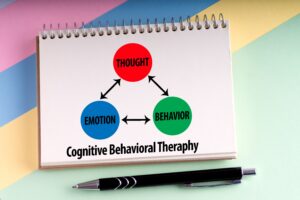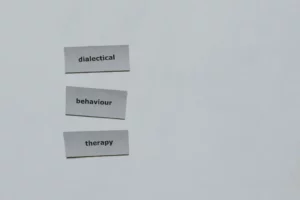CBT vs DBT: The Differences You Should Know
Mental health is an important topic that deserves our attention. Knowing the differences between various therapeutic techniques can empower us to make informed decisions about how we care for our minds and bodies. Two commonly discussed psychotherapy practices – Cognitive Behavioral Therapy (CBT) and Dialectical Behavior Therapy (DBT) – have distinct approaches and methods that set them apart. Tag along, and we’ll explore what separates CBT vs DBT so you can decide which one might be right for you or a loved one who needs mental health support.
What is Cognitive Behavioral Therapy (CBT) and Dialectical Behavior Therapy (DBT)?
When it comes to mental health treatment, Cognitive Behavioral Therapy (CBT) and Dialectical Behavior Therapy (DBT) are two prominent options that many people may consider. CBT is a form of talk therapy that examines the relationship between thoughts, feelings, and behaviors, with the goal of changing negative thought patterns and improving overall mental wellbeing.
Meanwhile, DBT is a type of cognitive behavioral therapy that focuses on developing mindfulness and emotional regulation skills, especially for individuals with borderline personality disorder or those prone to impulsive behaviors.
Both therapies have proven to be effective in treating a wide range of mental health conditions, and it’s important to work with a mental health professional to determine which may be the best fit for an individual’s unique needs.
Comparing the Different Goals of CBT vs DBT
Cognitive Behavioral Therapy (CBT) and Dialectical Behavioral Therapy (DBT) are both evidence-based forms of therapy that have helped many individuals cope with mental illnesses such as anxiety, depression, and borderline personality disorder. While both approaches share some similarities, they also have different goals.
CBT aims to help individuals identify negative thought patterns and modify them, ultimately leading to more positive behaviors and emotions. On the other hand, DBT focuses on acceptance and validation, helping individuals develop skills to regulate their emotions and improve their relationships with others. Both therapies have proven effective in helping individuals overcome their mental health challenges, but the different goals and approaches cater to different needs and preferences.
Examining the Techniques Used in Each Therapy Approach
When it comes to providing therapy to patients, there are a variety of approaches that therapists can take to provide support and treatment. Each approach utilizes different techniques and strategies in order to achieve therapeutic goals. For example, cognitive-behavioral therapy (CBT) focuses on identifying and challenging negative thought patterns in order to change behavior.
Meanwhile, humanistic therapy emphasizes empathy and personal growth through self-exploration. Other approaches, such as psychoanalytic therapy, focus on exploring early childhood experiences to better understand current behavior. By examining the unique techniques used in each approach, therapists can tailor their treatments to meet the specific needs of each individual.
Breaking Down the Length of Treatment Programs for CBT and DBT
When it comes to seeking therapy for mental health concerns, it can be overwhelming to navigate the different types of treatment programs available. Two popular methods of therapy are cognitive behavioral therapy (CBT) and dialectical behavioral therapy (DBT). Both CBT and DBT are evidence-based therapies that have shown to be effective in treating a range of mental health issues.
However, they differ in terms of the length of treatment programs. While CBT typically lasts for a shorter period of time, usually ranging from 6-20 weekly sessions, DBT programs can last for several months or even years. This is because DBT involves more intensive treatment, including individual therapy, group therapy, skills training, and coaching, whereas CBT mostly focuses on individual therapy. It’s important to talk to a mental health professional to determine which type of therapy and program length is best for individual needs.
Exploring the Benefits of Each Method of Therapy
Therapy can take many different forms that all come with their own unique benefits. Cognitive-behavioral therapy, for instance, helps you to understand the thoughts and behaviors that might be contributing to your mood and change them for the better. Meanwhile, psychodynamic therapy is focused on helping you uncover past wounds and how they might be affecting your current emotional state.
Family therapy can be ideal if you’d like to work with your loved ones to solve problems and establish healthy communication, while group therapy offers the chance to connect with people who may have similar experiences and find a sense of support in a community setting. By exploring the different methods of therapy, you can find the approach that works best for you and your specific needs.
Understanding When to Choose CBT or DBT for Your Mental Health Goals
When it comes to deciding on a mental health treatment plan, understanding the differences between Cognitive Behavioral Therapy (CBT) and Dialectical Behavior Therapy (DBT) is crucial. CBT is focused on changing negative thought patterns and behaviors, while DBT incorporates mindfulness techniques and skills to improve emotional regulation and interpersonal relationships.
The decision on which therapy to choose can depend on your specific mental health goals. CBT may be best for those struggling with anxiety or depression, while DBT may be more effective for individuals with borderline personality disorder or a history of trauma. A mental health professional can help assess your needs and determine the best course of treatment for you. Ultimately, the goal of both CBT and DBT is to help you live a more fulfilling life by improving your mental health.
Ultimately, it is important to note that both Cognitive Behavioral Therapy (CBT) and Dialectical Behavior Therapy (DBT) are evidence-based therapies that are effective in treating a variety of mental health conditions. Although the two approaches have similarities, there are also crucial distinctions between them. It is essential that an individual research and assess what type of therapy fits best with their goals and needs for treatment.
Generally speaking, CBT is shorter term while DBT is longer term—this can affect the outcome for some individuals. Understanding these differences between CBT and DBT can help you make an informed decision regarding your mental health journey. Taking the time to identify which treatment option suits your individual needs should not be taken lightly. If you’re looking to start on your path of recovery today, consider getting in touch with a qualified mental health provider who can further guide you through this process.
Ready To Get Started
Take the first step towards the future you deserve.
What Our Clients Say
-
I have so much to say about this wonderful place, but I’m sure my words will never do my experience justice. Southern Live Oak Wellness and it’s people not only helped me find myself again, but they saved my life.
Alex M.
Johns Creek, GA -
Southern Live Oak Wellness saved my life. The therapists genuinely care about the clients and helping them get better. Working on yourself is not easy, but the therapists help guide you and make you be able to work through whatever may be going on.
Rachel S.
Lawrenceville, GA -
I can easily say that Southern Live Oak wellness saved my life. I had hit rock bottom when I first got admitted and they helped me build myself up from nothing. I have learned how to cope with things I never thought I would be able to handle.
Taylor R.
Dallas, GA
-
Going to SLOW has impacted my life in ways I never thought possible. I came for help with my mental state and came out with so much more; life skills, medical advice, mental health counseling and addiction treatment. SLOW is a whole life transformation program and I highly recommend it to anyone I know!
Kaylan F.
Kennesaw, GA -
When I was a part of this program, I had the most personal growth I’ve had in my entire life. All of the tech staff were willing to talk to me whenever I felt like I needed someone to talk to and the group sessions gave me multiple perspectives I never would’ve thought of from people in similar situations to me.
Dylan C.
Belleville, IL -
This place has changed my life. For the first time in my life I felt heard and cared about. The clinical staff is amazing. The groups are well structured. You learn a lot of different skills to help you in life this is the best mental health facility to come to.
Ashley H.
Brunswick, GA


